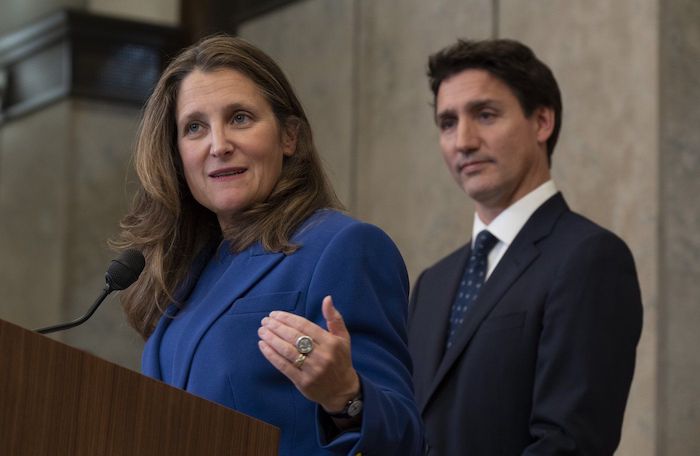National
Finance Minister Chrystia Freeland resigns from Trudeau Cabinet

From the Coalition of Concerned Manufacturers & Businesses of Canada

2025 Federal Election
Poilievre’s Conservatives promise to repeal policy allowing male criminals in female jails

From LifeSiteNews
The Conservative Party is pledging to ban male criminals who identify as female from being housed in women’s prisons, reversing the current Trudeau-era policy.
The Conservative Party platform is promising to repeal a Trudeau-era policy that allows gender-confused men to be housed in women’s prisons.
According to Pierre Poilievre’s Conservative Party platform released on April 18, male criminals who claim to be gender-confused and identify as female will not be sent to female prisons.
Under Poilievre’s pledge to restore public safety, his platform promises to “defend women’s safety by repealing Commissioner’s Directive 100, which allows male offenders to be housed in women’s prisons and ensure that women’s spaces and services remain protected in federal institutions and policy.”
Currently under the Liberal Party, the policy is to place prisoners according to their “self-identified” gender, not according to biology. As a result, male rapists and murderers can be sent to female prisons.
However, in December, the case of a brutal murderer caused an uproar on social media as many pointed out that putting the man in a women’s prison would pose a danger to female inmates.
At the time, Mohamad Al Ballouz, who brutally murdered his wife and two children, requested that he be sent to a female prison as he began identifying as a woman after committing the murder.
Crown prosecutor Éric Nadeau revealed that the murder took place in September 2022 when Al Ballouz slaughtered his family at their Brossard apartment. He stabbed his wife 23 times before suffocated his children and trying to set the apartment on fire. He then ingested windshield washer fluid, which is believed to have been a suicide attempt.
During the trial, Quebec Superior Justice Eric Downs described Al Ballouz, as having a “sadistic character” and being “deeply narcissistic.” He was sentenced to life imprisonment with no chance of parole for 25 years.
Throughout the trial, Al Ballouz, a biological male, claimed to be a woman and demanded that he be referred to as “Levana,” a change which was made after he was charged for his crimes. Notably, the Canadian Broadcasting Report’s (CBC’s) report of the case refers to the convicted murder as “she” and uses his fake name.
However, Canadians, including Poilievre, quickly pointed out that placing Al Ballouz in a female prison would prove dangerous for female inmates.
As a result, Correctional Services Canada recently announced that he will be “will be incarcerated in a men’s institution.”
2025 Federal Election
Carney Liberals pledge to follow ‘gender-based goals analysis’ in all government policy

From LifeSiteNews
‘We will continue to update the GBA+ tool to ensure it reflects the identities and values of all Canadians, including diversity as a core value.’
Prime Minister Mark Carney’s Liberal Party is promising to effectively mandate that all government policies and initiatives be measured using “Gender Based Analyses” before being approved and implemented.
The Liberal’s “Canada Strong” election platform, under the Gender Based Analyses (GBA) tab, pledges to “ensure that every measure in this platform will be implemented with a full GBA+ analysis – so that we can continue to build Canada strong, for all Canadians.”
“A Mark Carney-led government will support and champion all Canadians, including by reviewing policies and programs using an intersectional lens. We will continue to update the GBA+ tool to ensure it reflects the identities and values of all Canadians, including diversity as a core value.”
The GBA tab also mentions “2SLGBTQI+ people” four times, three of which are related to funding promises.
It notes that a Carney-led government would protect “the values” the Charter of Rights and Freedoms was “founded on – which are under threat – and ensuring the protection of women, people with disabilities, racialized and Indigenous communities, and 2SLGBTQI+ people.”
Carney already stated his government would provide sterilizing puberty blockers to children “without exception,” calling harmful “transitioning” surgeries and chemical “treatments” a “fundamental right.”
While campaigning to become Liberal Party leader, Carney had also promised that his government would pursue an agenda of “inclusiveness” to counter U.S. President Donald Trump’s more socially conservative agenda.
His promise to promote “inclusiveness” in Canada in opposition to Trump’s agenda came only days after former Prime Minister Justin Trudeau’s Liberal government promised an extra $41.5 million in taxpayer funds to advance 106 pro-LGBT projects “across Canada.”
Carney, whose ties to globalist groups have had Conservative Party leader Pierre Poilievre call him the World Economic Forum’s “golden boy”.
Canadians will head to the polls on April 28.
-

 International2 days ago
International2 days agoPope Francis’ body on display at the Vatican until Friday
-

 2025 Federal Election20 hours ago
2025 Federal Election20 hours agoCarney’s Hidden Climate Finance Agenda
-

 2025 Federal Election1 day ago
2025 Federal Election1 day agoFormer WEF insider accuses Mark Carney of using fear tactics to usher globalism into Canada
-

 2025 Federal Election12 hours ago
2025 Federal Election12 hours agoThe Anhui Convergence: Chinese United Front Network Surfaces in Australian and Canadian Elections
-

 2025 Federal Election10 hours ago
2025 Federal Election10 hours agoTrump Has Driven Canadians Crazy. This Is How Crazy.
-

 COVID-192 days ago
COVID-192 days agoRFK Jr. Launches Long-Awaited Offensive Against COVID-19 mRNA Shots
-

 Business2 days ago
Business2 days agoTrump considers $5K bonus for moms to increase birthrate
-

 2025 Federal Election2 days ago
2025 Federal Election2 days agoCanada’s press tries to turn the gender debate into a non-issue, pretend it’s not happening



